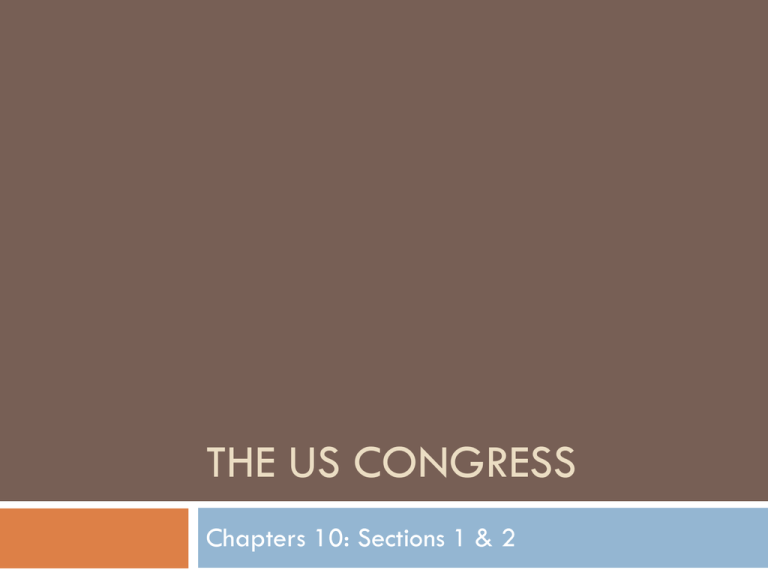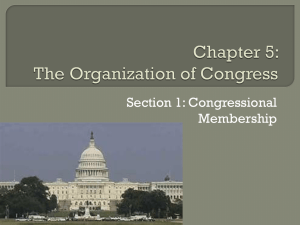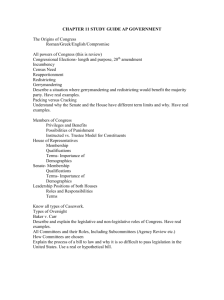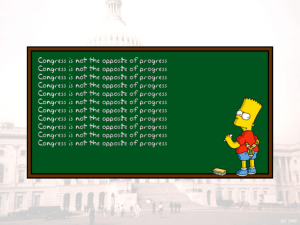THE US CONGRESS Chapters 10: Sections 1 & 2
advertisement

THE US CONGRESS Chapters 10: Sections 1 & 2 US Congress- What is the purpose of Congress? Why did the Constitution establish a Bicameral legislation? The primary duty of Congress is to write, debate, and pass bills. The north wing (left) houses the Senate, while the south wing (right) houses the House of Representatives. Historic & practical reasons for bicameral Congress. British Parliament; idea from Britain. Constitution ConventionCompromise Separation of Power- Two Houses Check each other!! House is based on population of the state Senate- equal representation- each state has two senators Vocabulary Terms for Congress Term- An assigned period of time for an elected official to serve House of Representatives- 2 years Senate- Sessions- A period of time each year when the Congress meets to talk about laws Two 6 years sessions in a term! Adjourn, end of a meeting-usually starts in January and ends in late fall. Congress & Sessions Other Vocab Terms Convenes – when they begin work in a session Recess – short breaks during a session Special Session – called by President to solve an issue- emergency 27 in history – Truman’s in 1948 last one There are NO term limits on Congress Congressmen can be elected over and over again….. House of Representatives & Population Each state is divided in districts Each district elects its own representative How many districts are in PA? What district is Media? When we vote in Media, we are only voting for one House member, one representative out of the total number for PA in U.S. Congres What happens if a state decreases or increases in population? Several ways congressional districts change Re-appropriation after a census & Gerrymandering! Census every 10 years in the U.S. US Census & Re-Apportionment of House Members- 2010 Census Bases on the Census, district lines are redrawn…Reapportionment Gerrymandering –an unfair drawing of district lines, giving a party or a group an advantage. “kidnapping” – redraw lines to move an incumbent into a district less likely to be reelected Gerrymandering…. Packing Packing, state legislators “pack” as many opposing voters into a single district as possible. Ex. Republicans may “pack” democrats into only 1 district, and republicans into many… Cracking Cracking-the party in power splits up (spread out) voters who support the opposing party. Ex. Republicans may spread out the democrats so they can never win in a district. Analysis the Cartoons? Reapportionment Act of 1929 – set 435 as permanent number of Reps! How often do we have elections? House of Representative term = two year Senators every term = 6 years President’s and Governors term = four years Every two years we have elections in the U.S. Every 2 years all 435 House Members are up for election! There are many districts in the U.S., states with high populations have more districts. Elections Every 2 years- Even years All 435 House members; election every 2 years Elections fall on even years! Every 2 years; 1/3 of Senate seats up for election Governors/ Executives of State- Elections vary… Party control of Governors' offices after January 11, 2014. Democratic Governor- Blue Republican Governor- Red Independent Governor- Independent 112 Congress- Pres. Obama 193 Democrats, 242 Republicans 51 Democrats, 47 Republicans, 2 Independents 113 Congress; President’ Obama Which party controls the House & Senate? Midterm Elections- November 2014 Which party will take control of Congress? Governors race too! Speaker of the House= leader Elected by the majority party members in the House Runs the business of the House If President & V. President cannot serve, he becomes the President.







